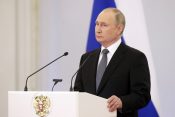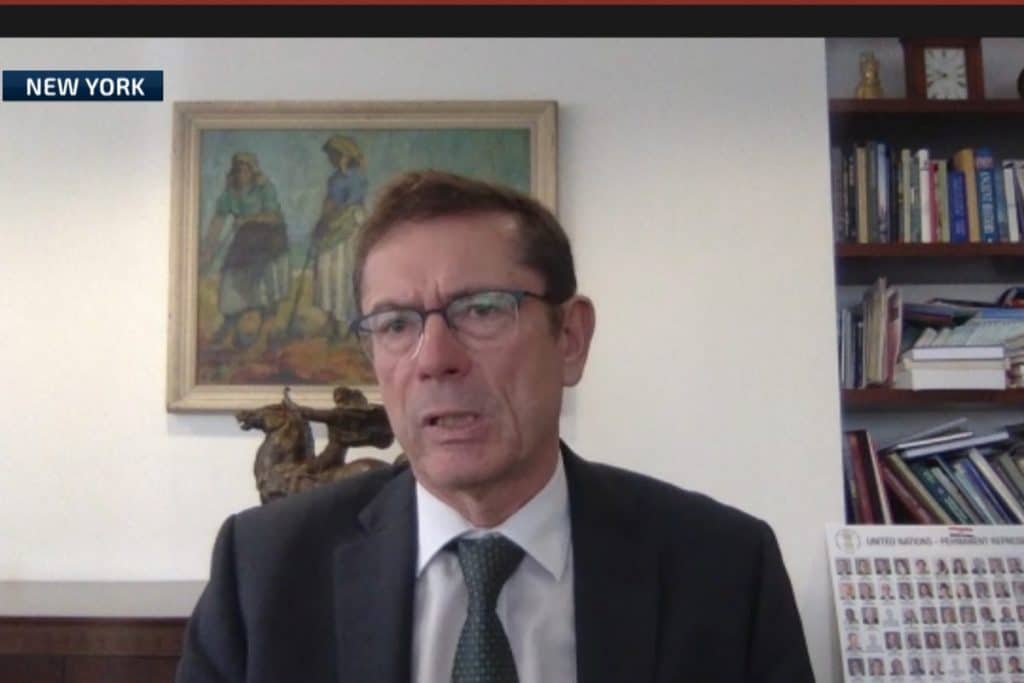Croatian Ambassador to the United Nations Ivan Šimonović was a guest on TNT and commented on the latest events in Ukraine.
“The situation in Ukraine was at the center of discussions at the General Assembly, but it was also discussed at the United Nations Security Council, which this month is headed by France. Among the emphases in the talks regarding aggression against Ukraine, I would single out the following emphases: Emphasis on aggression as a violation of international law and the need to stop it. Then on the availability of food and energy prices, and finally on the fear of further escalation and a possible nuclear conflict. This is exactly a new dimension. “Russia is still isolated in the UN, which was evident from the ovation that Zelensky received when he addressed the general assembly,” he said.


As he states, the consequences of the conflict are tragic for Ukraine and dramatic for Russia. “They are serious for Europe, but also dangerous for the whole world. We already have tens of thousands of victims, it is about the terrible destruction of Ukrainian towns and villages. On the other hand, we also have the global problem of shortage and rising grain prices. There is also the energy crisis, which is a big blow for Europe, which is dependent on Russian gas. This comes to the fore mostly in discussions. There are rare positive developments. Prisoner exchanges ease human suffering, but also lead to increased trust between the parties. From the human rights side, this is a great gain. We got our citizen Prebeg, but I am afraid that there is such a deep mistrust between the parties in the conflict that even these measures will not help much. Every time there is an opportunity, they should be taken,” he said.
“As far as the unblocking is concerned, its motive is that no one wanted to be responsible for the increase in hunger in the world. After many disappointments, the UN played a special role there because of the fear of increasing responsibility for world hunger and rising food prices. I do not believe that anyone will dare not to continue with this aid to mitigate the global humanitarian consequences of the conflict in Ukraine,” he said.
“Russia has not achieved its war goals”
He believes that the chances for serious peace negotiations are weak at the moment. “On the one hand, we have Russia, which has not achieved its war goals, and which, for its own internal political reasons, does not want to admit it. On the other hand, we have Ukraine, which is on the rise and has shown that it can defend itself and return the occupied territories. We also have the third factor that Russia reacts to this situation by escalating the conflict. This is a very serious escalation. Russian sources say that the partial mobilization is much wider than 300,000 recruited soldiers. In addition, it should be seen in the context of other Russian moves, which is the current holding of referendums in four regions in Ukraine,” he said.
“The third factor is the Russian threat to suppress any threat to Russia’s sovereignty with all available means, including nuclear. Imagine the situation, after this referendum, which in the legal sense is illegal, but is held anyway, annexation will follow, we will have a situation where, from Russia’s point of view, Ukraine is considered an occupier. Any support to Ukraine in this sense is a violation of Russia’s territorial sovereignty, because the threat of the possibility of using all forces, including nuclear ones, is valid. The whole situation is very serious,” he said.
He says that the situation in Russia will change, regardless of manipulation in the media, and that resistance will grow, along with ever wider mobilization. “We see that many minorities and the rural population feel that they are particularly affected by the mobilization. “That’s where the resistance against such risks will surely grow. There is a balance between the fear of repression if they oppose the mobilization and the fear of the consequences if they respond to the mobilization. It is correct to point out that there are now columns of people trying to leave Russia on the border with Georgia and Kazakhstan. Estimates are that it takes more than a day to get out of the country. This is a great loss for Russia because those who have left Russia so far have been young and educated, who are potentially the ones who could cause problems for the Russian regime, so cynically one could say that it is better if they leave,” he said.
“A strong report has been submitted that highlights the responsibility for the crimes and the need for the investigations that are being carried out. Many countries, including Croatia, support ICC investigations. The Office of the High Commissioner for Human Rights conducts an observation mission to Ukraine, but it must be careful in its reports, because it reports from the occupied parts of Ukraine, so that it can be the eyes and ears of the international community. On the other hand, a special investigative commission was established by the Council for Human Rights, which talks about tortures, murders and rapes,” he said.
He claims that the UN’s problem is that, according to the charter, it cannot exclude a single member, and that there is no agreement for such a thing by all members of the Security Council. “Such initiatives make political sense. They help to see the extent of the problem of vetoes and blockades of the Security Council. It is difficult to achieve goals in this environment. Pessimists are those who think that a nuclear war will destroy us, and optimists are those who believe that we will survive, until the moment when climate change destroys us,” he said.
Track N1 via Android apps | iPhone/iPad and social networks Twitter | Facebook | Instagram.

